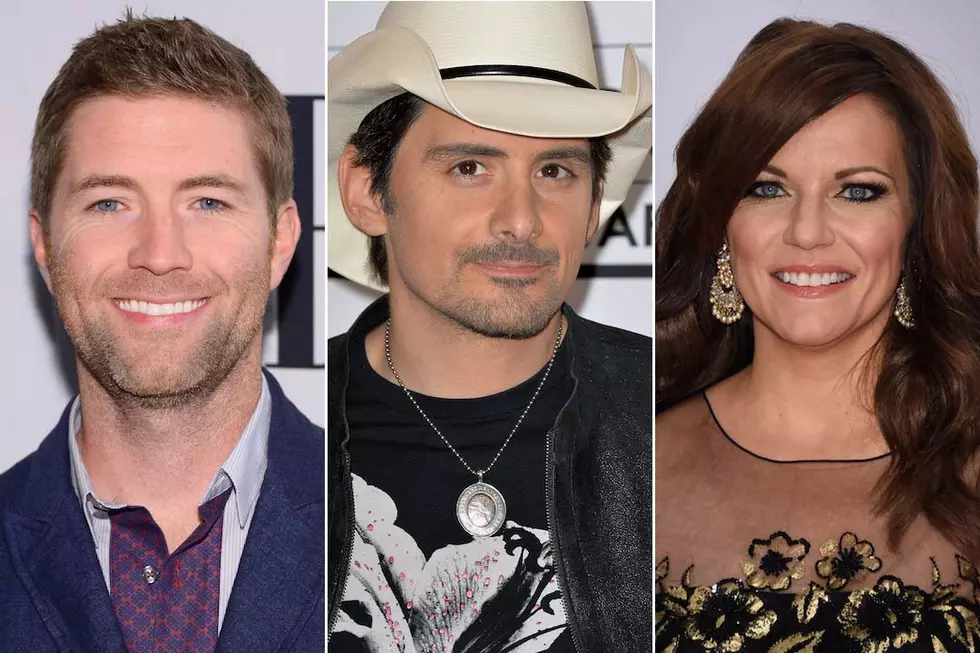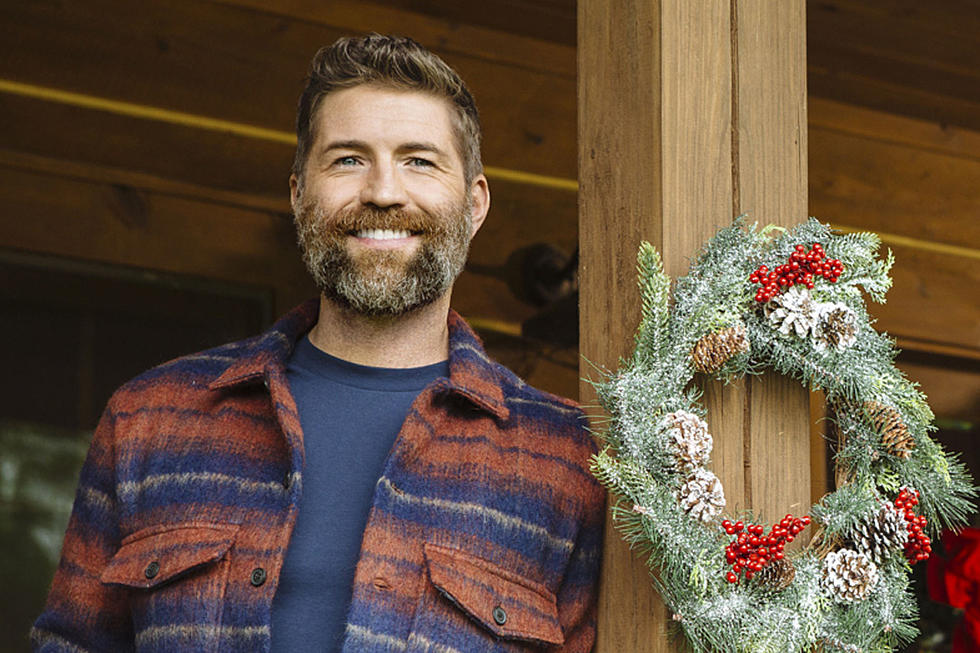
Josh Turner Interview: Hitmaker Talks Faith, Career + New Book, ‘Man Stuff’
Josh Turner is well-known in country music circles for his conservative values. The singer is releasing his first book, 'Man Stuff: Thoughts on Faith, Family and Fatherhood,' on Tuesday (April 29), and it's chock-full of his trademark mix of humility, deeply-held faith and even humor.
Living up to its title, the book is equal parts autobiography, life lessons and a modern conservative manifesto, taking small stories from Turner's own life and magnifying them to impart the singer's observations on his deeply-held beliefs about religion, as well as his social values and work ethic.
The Boot caught up with Turner recently to discuss 'Man Stuff,' his upcoming album and the changing role of traditional country music in the marketplace.
What inspired you to write this book in the first place?
Thomas Nelson approached me about it, and it appealed to me, and I ran with it. It excited me, and I just felt like it was an opportunity to make an impact in a different kind of way, and share stories that I haven't been able to share thus far.
I didn't see the name of a co-writer on the cover. Does that mean you actually did all of the writing work?
Somewhat. I can't take all of the credit, because I actually did give credit to a writer who did help me with the manuscript. His name is John Blase, and you'll find that on one of the first couple of pages.
But they kinda wanted him to be somewhat of a ghost writer, I guess is what they call them. But I felt like he had -- especially with this being my first book, and me not knowing how to go about it -- I felt like he deserved the credit. So I threw his name in there.
But yeah, ninety percent of the words are mine. I sat down the first day with this process and sat for 13 straight hours, just pouring my heart out, and wracking my brain just trying to think of any and every story from my life that I felt like I have gained wisdom from, or learned a lesson from. We probably knocked out close to fifty stories the first day.
That's a lot of commitment. Are you happy with the finished product?
Absolutely. I'm very proud of where it's at. I'm in somewhat disbelief that I actually have a book. [Laughs.] Sometimes I have to go back and look at it a little bit, and read it, and remind myself that yes, you are an author. It's kinda wild, just knowing that, and I think my family and friends kinda feel the same way, because I've gotten a lot of calls and texts from family and friends, just making comments about it. They've been used to me making records for years, but when they found out I had a book coming out, they were somewhat in shock. [Laughs.]
How did you decide what stories to put in, and what to leave out? There's so many different avenues you can explore in a book-length project.
Some stories were left out, mainly because they didn't quite have the depth, or they didn't have the subject matter that they were looking for. But most of them were kept, and like I say, I was looking for stories that I felt like people could take something from them.
I've learned from guys like Johnny Cash, who was one of my big heroes, as far as, just be yourself, and don't make excuses for it.
This is a book that's very much to do with your faith, and it strikes me that the music business is hard enough for everybody, but it could be potentially harder for a person of deeply held convictions, because part of it can involve having to do some things that are incompatible with that faith. Do you find that at all, as far as a conflict between your faith and the business?
Sometimes, but it is very rare. I think most people have figured out what kind of artist I am, and they know what to expect from me, and what not to expect from me. I surprise them every now and then [laughs], but it's just a part of who I am. It's like, if you ask me to leave that part out, it would be like asking Johnny Cash not to wear black. [Laughs.] You know, it's not gonna happen.
I've learned from guys like Johnny Cash, who was one of my big heroes, as far as, just be yourself, and don't make excuses for it.
You write in the book that you've sometimes had a hard time accepting criticism. That seems like it would be very difficult for a person in your position, because there's criticism every day in the music business.
Being an artist -- especially a professional singer, songwriter and artist -- you're gonna be in a place and in a position where you're gonna receive criticism. So you develop a pretty thick skin pretty quickly. But I'll tell you, when I first got into this business and started experiencing a lot of that, it hurt. Because being an artist and a creative person, you kinda throw your heart out there, and it's basically like, 'Hey everybody, look -- it's my heart, come stomp on it.' [Laughs.] You know?
And it's still that way to this day, but I've kinda become pretty thick-skinned about it, become pretty tough. It's like, hey, anything you throw at me, I'll be able to take it.
Do you find that you can actually learn from criticism, if it's fair?
Yeah, I think so. I'm one of those rare artists where, I'll get online every now and then, and I'll go through and read comments on my records and singles. And some of it's a little ridiculous, but it just kinda gives me some insight into what the fans are thinking, what they're liking and what they're not. And everybody's entitled to their own opinion, but at the end of the day, I have to do what I feel comfortable about.
But I'm not one of those people, either, that gets caught up in doing the same thing over and over again. I'm always trying to improve upon myself, always trying to find new ways to do the same old thing.
Being an artist and a creative person, you kinda throw your heart out there, and it's basically like, 'Hey everybody, look -- it's my heart, come stomp on it.'
Do you have any thoughts on other books you might want to write in the future?
No. I've just written this book, and I'm still working on this album, and I'm kind of written out. I've written close to 60 songs for this record, and my well is kind of empty right now. [Laughs.] Ask me in six months, and I may have an answer for that.
Wow, that's an incredible number of songs.
Yeah, you ain't kidding! [Laughs.]
Obviously you can only choose a few of those. What happens to the others? Do you re-visit them at all, or do they fall by the wayside?
I don't ever see them as going to waste. I'll probably re-visit them down the road at some point. I've always written for myself, so those songs aren't going to be dispersed out into the community, but I'll always have those songs to go back to. And I've learned from my heroes, like John Anderson -- who's also a good friend of mine -- I've learned from him to just keep writing, whether you have a project that you're working on or not. Keep writing, keep that ball rolling, keep stockpiling songs, because you can never have too many.
Have you ever gone through a terrible dry spell as a writer?
Yes, I just did. [Laughs.] The first half of the sixty songs were probably considered a dry spell.
How do you snap out of a thing like that?
You just keep writing, just keep going.
Do you live with that fear that some writers have, that, 'What if I never write another good thing?'
I don't let my mind go there. I feel like I'm always going to have an interesting view on life, and love and music, so that thought's never crossed my mind.
What do you want people to have as their takeaway from reading this book?
Basically I just want it to be an encouragement. I want it to be uplifting to whoever reads it. I want it to be a feel-good kind of book, but at the same time, it has depth. To me it's an entertaining book, it's a funny book, it's a meaningful book, and it can relate not only to men, but to women, too.
More From TheBoot







![How Josh Turner’s Wife Inspired His Most Original Christmas Song — Taste of Country Nights, On Demand [Listen]](http://townsquare.media/site/204/files/2021/12/attachment-josh-turner-interview.jpg?w=980&q=75)
![Josh Turner Casts Real-Life Veterans for Powerful ‘Soldier’s Gift’ Video [Watch]](http://townsquare.media/site/204/files/2021/11/attachment-Josh-Turner-Soldiers-Gift-Video.jpg?w=980&q=75)
